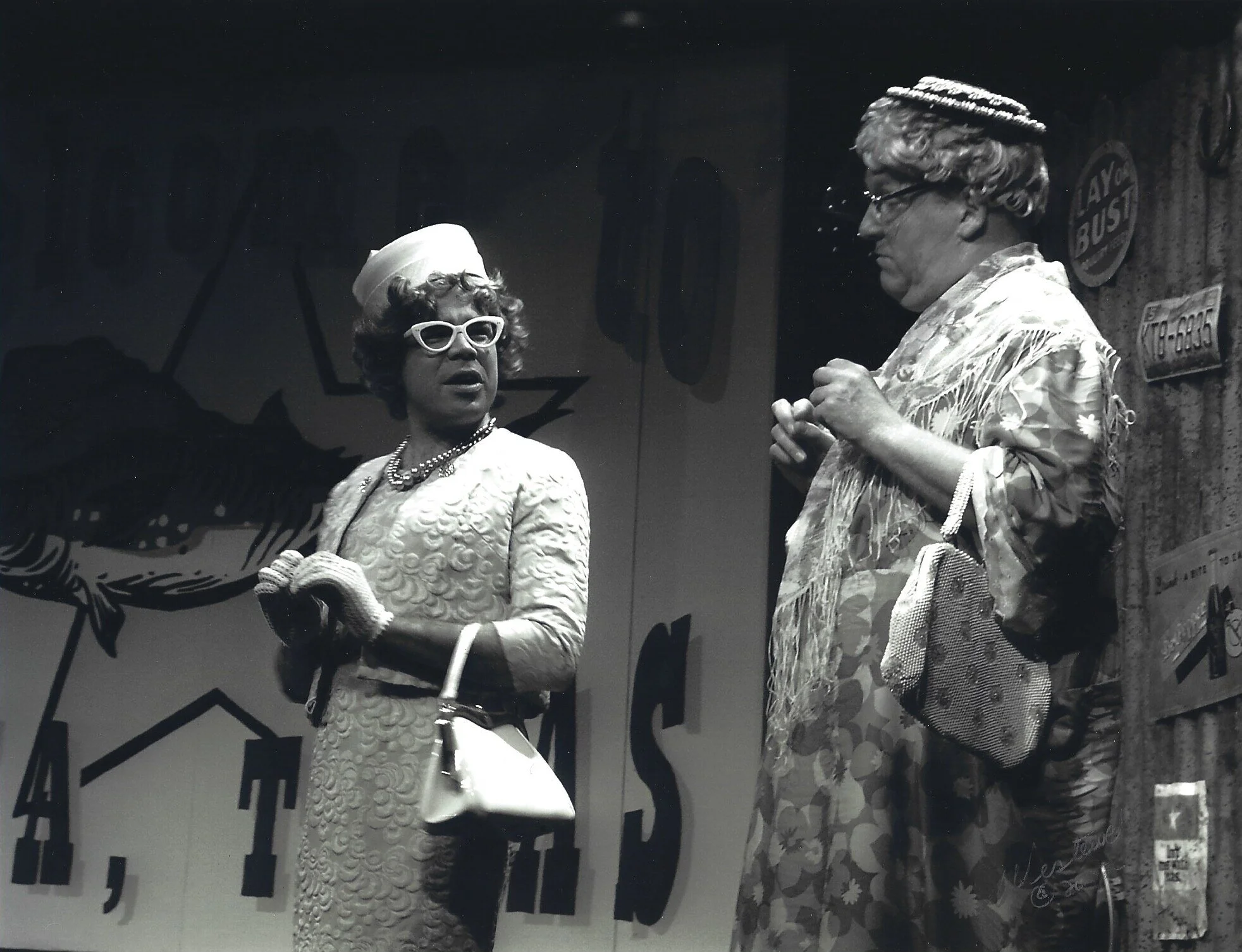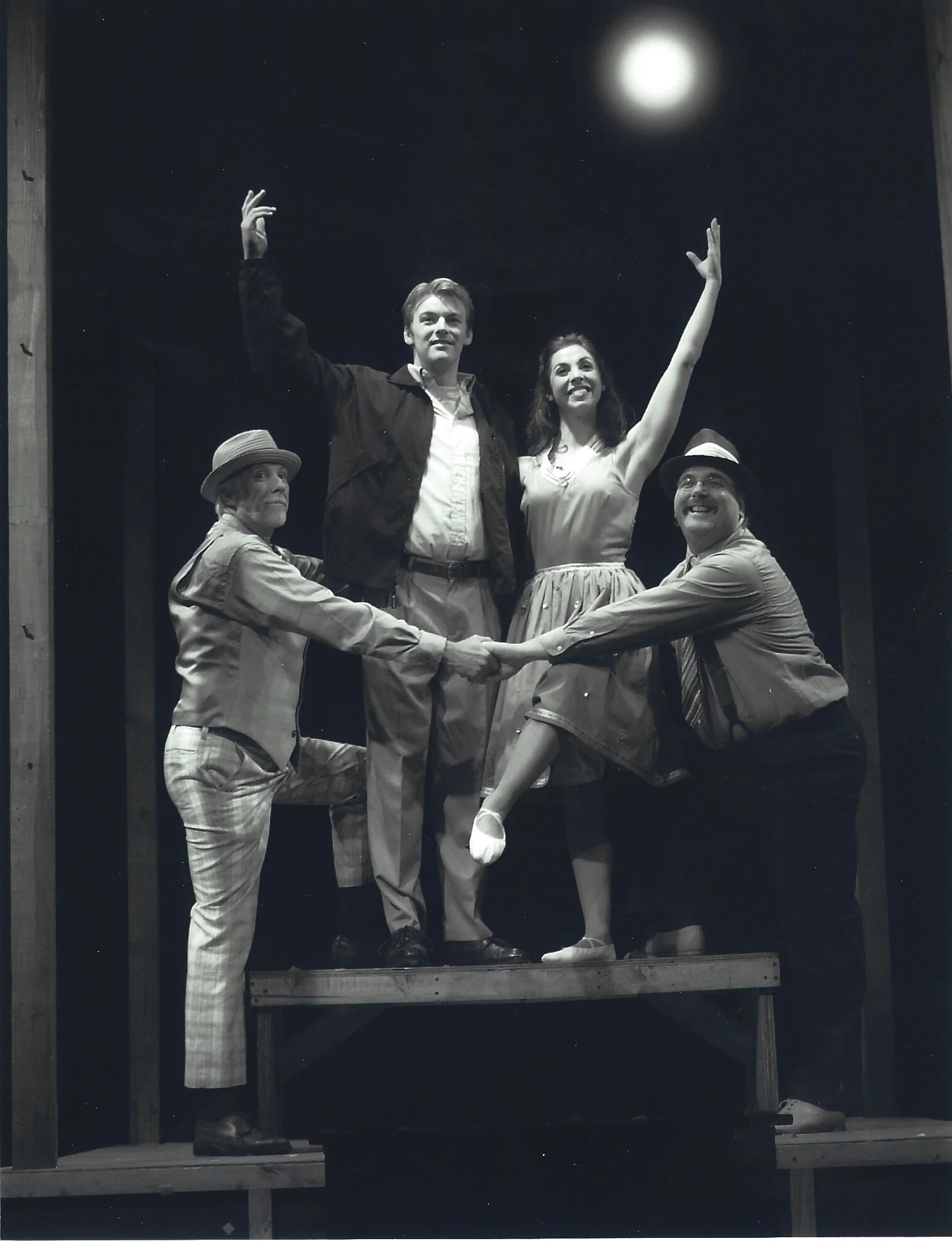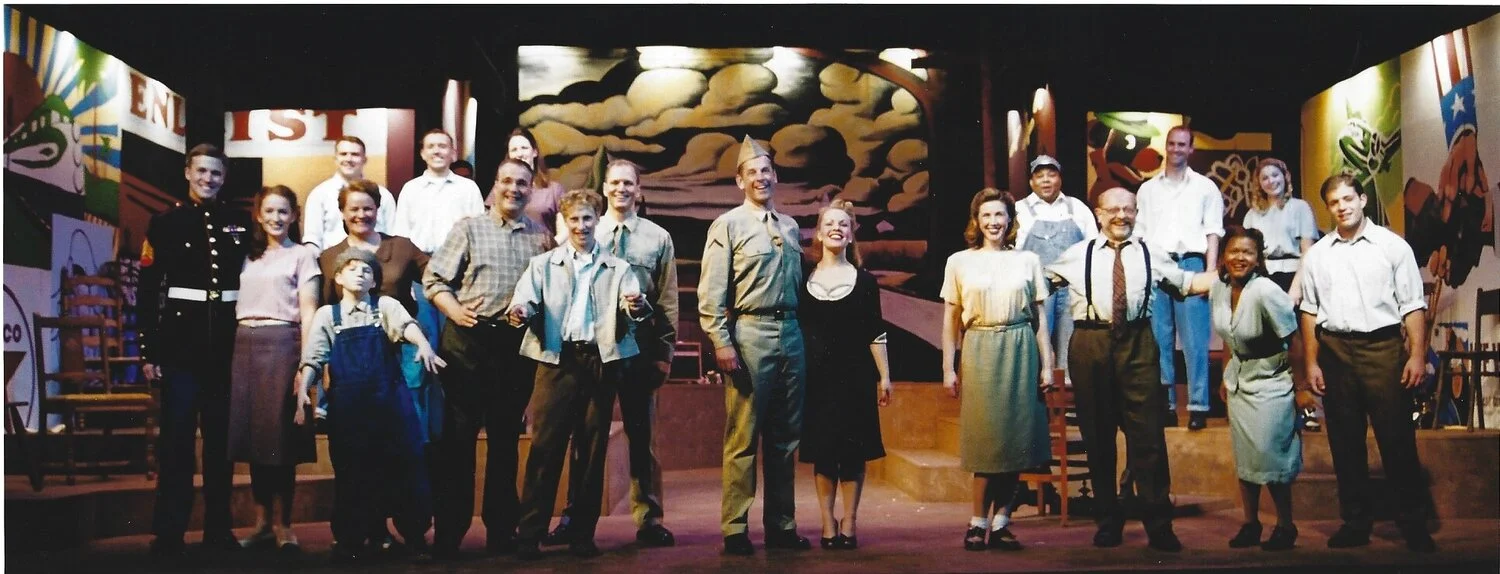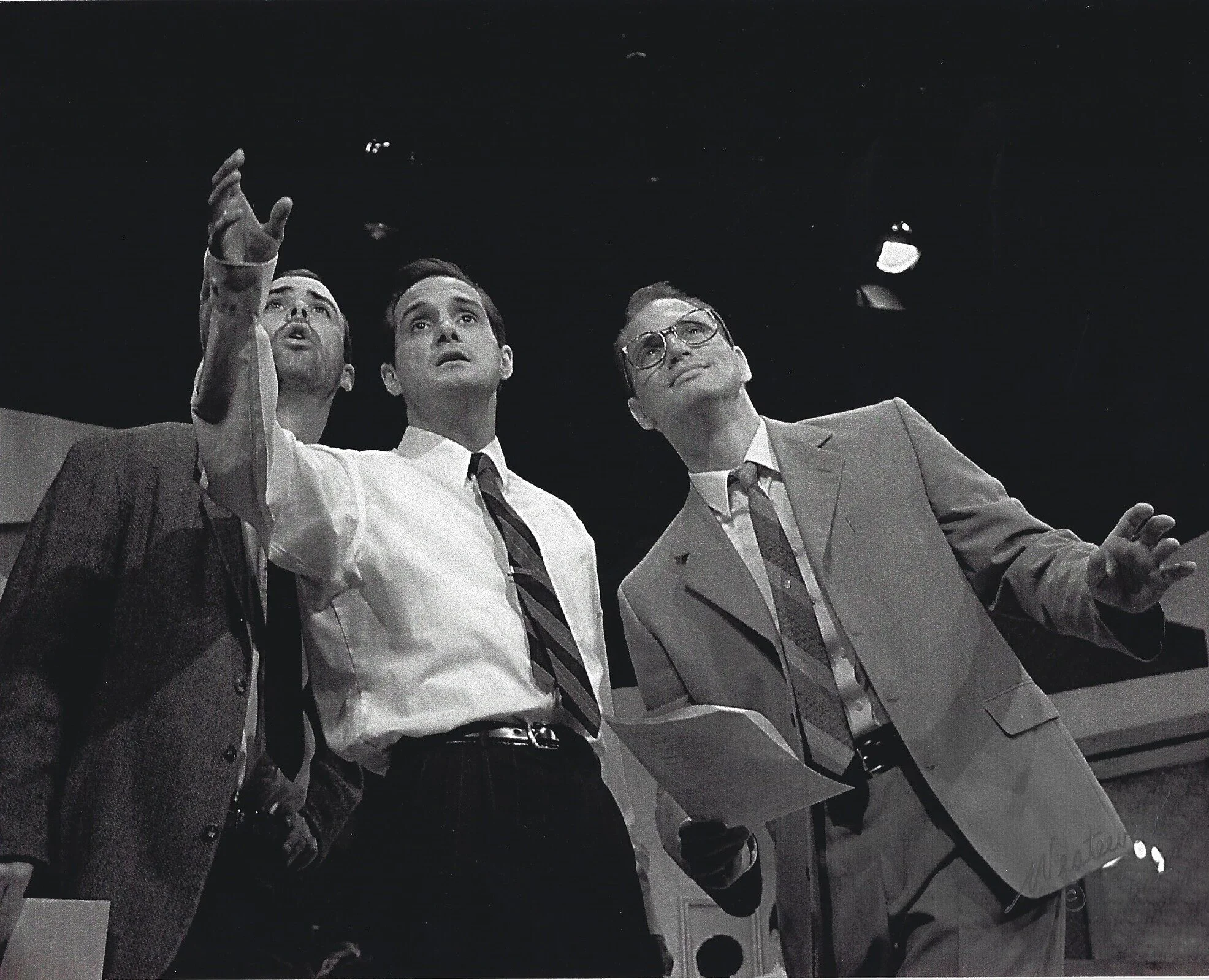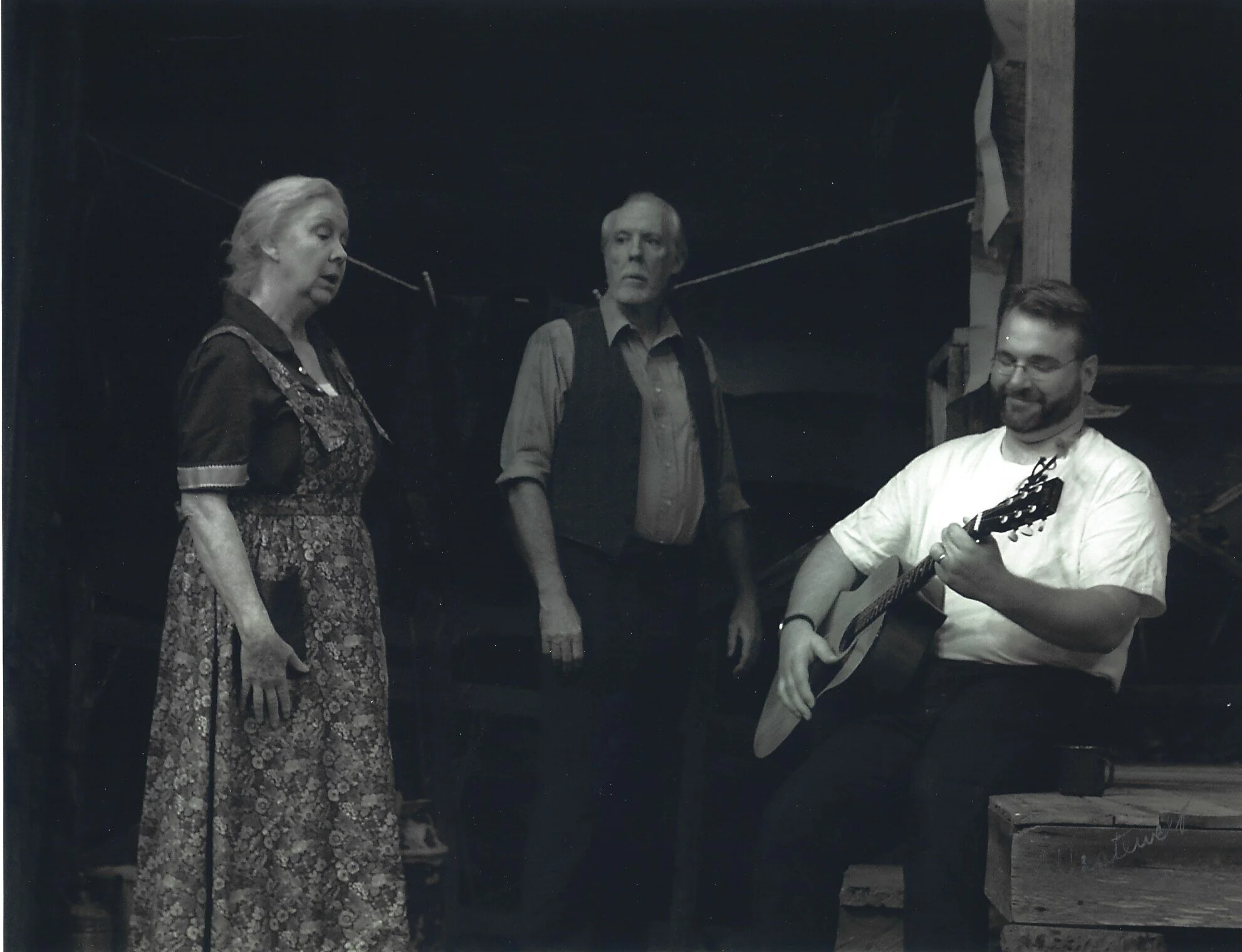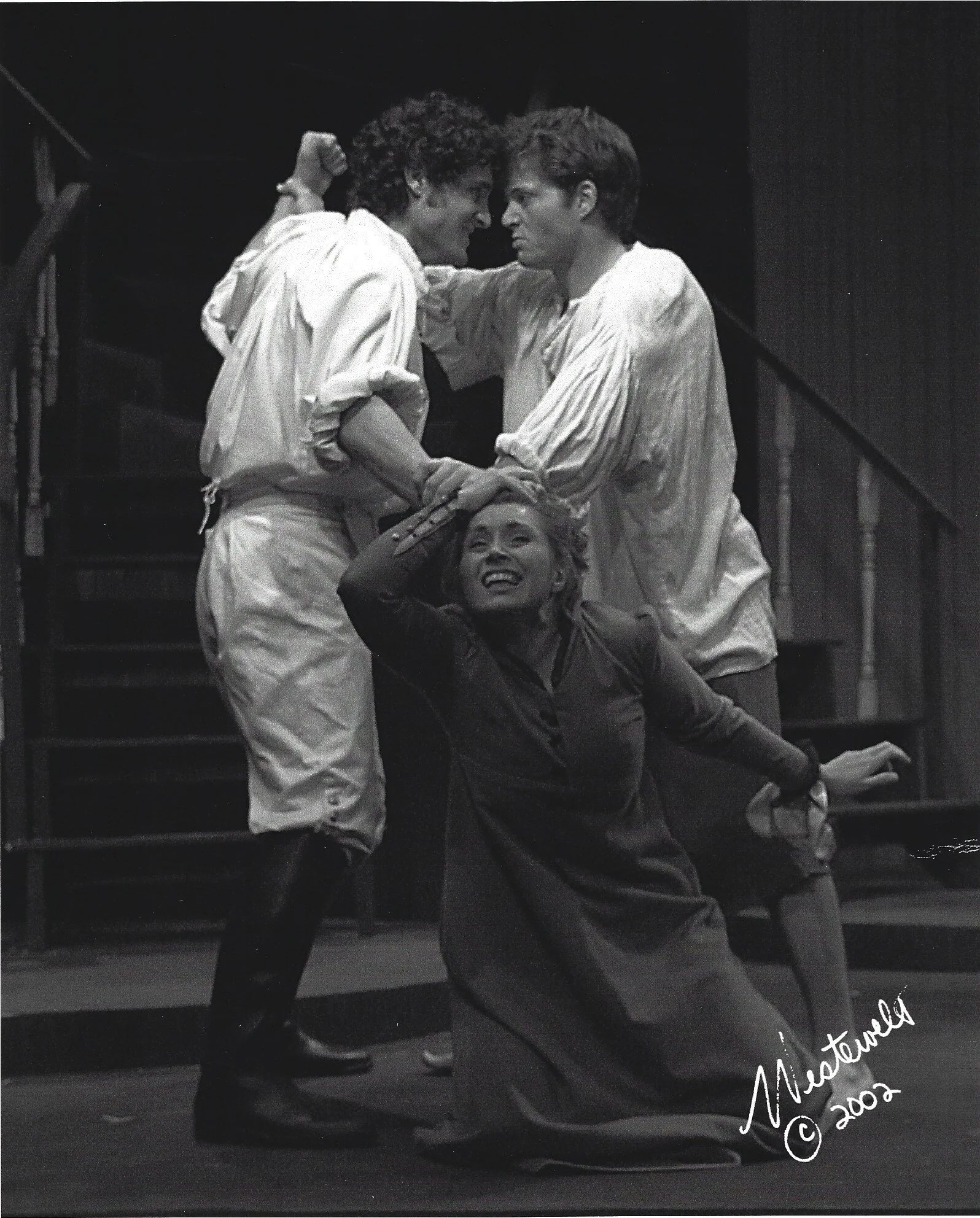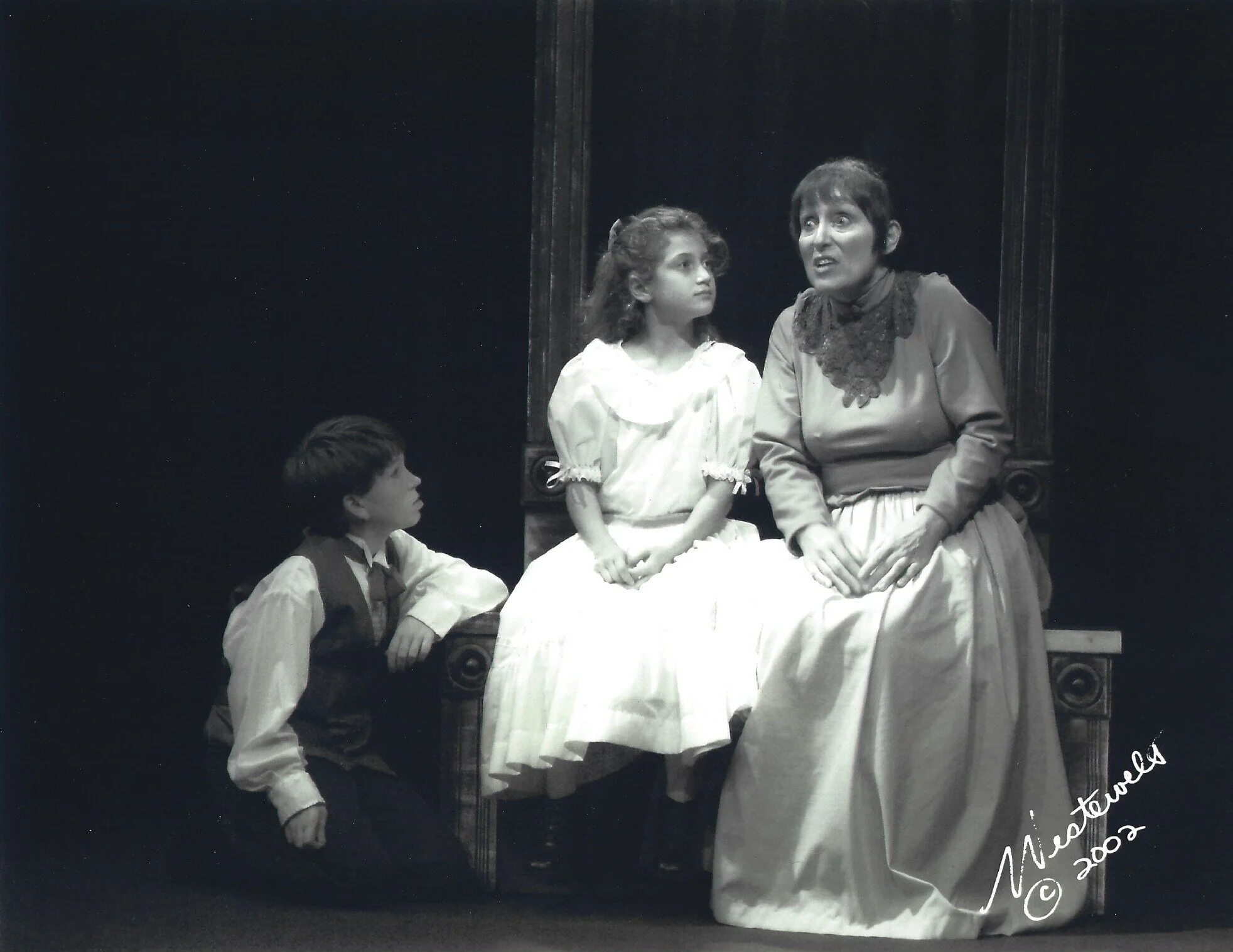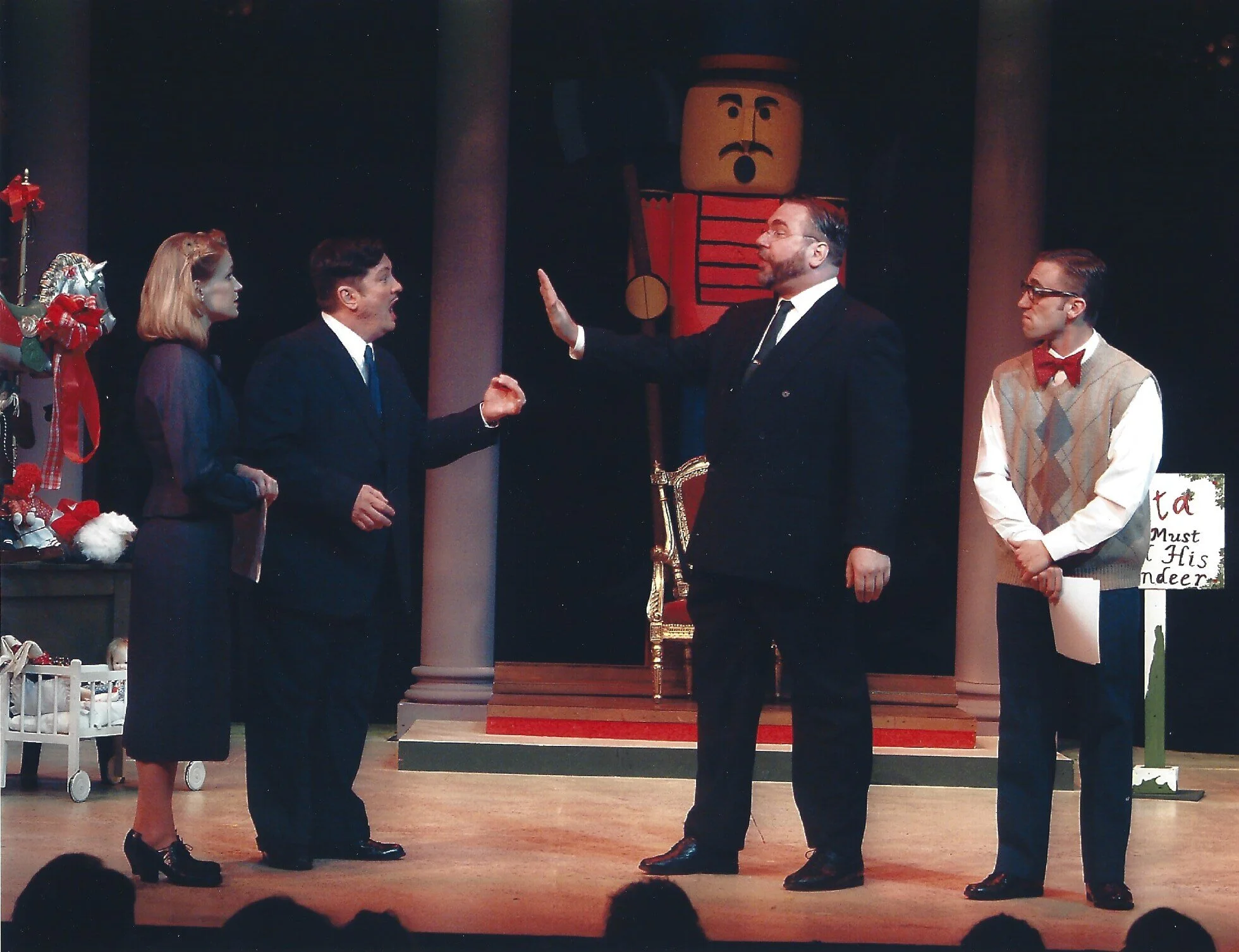Warner Crocker: 2002
There is some confusion as to whether 2002 was the beginning of Wayside’s extended season that featured productions over a 12-month span, or if that were a move that became official in 2003. Part of this confusion arises because the play titles for 2002 are listed by using a single number for the year, while all following documents show combined years such as 2003-2004. It is also a bit confusing when the productions performed following the annual Christmas show were included as part of the schedule for the previous calendar year. Most information for 2002 indicates the season beginning in March of 2002 and concluding in December of that year. Beginning in 2003, Wayside began indicating their productions under the two-year heading, such as 2003/2004, or 2004/2005, a format continued until its closing.
Some help in this confusion is found in an extended interview with Warner Crocker, where he states, “Because of the increase in subscription sales … the theater is expanding its 2002 season with two more shows and monthly theater activities … There will be entertainment at Wayside Theatre for 44 of this year’s 52 weeks.” He adds, “This is the first year in the theatre’s history that there will be something going on here all 12 months” (McCarty. “A Bigger, Better Season ….” TWS. 23 Jan. 2002). Some of the extended season’s events took place in the Curtain Call, and some were performed on the main stage.
The Curtain Call events began in January with four performances over two weekends by actor and folk singer, Richard Follett. Following for one weekend was a program of Celtic music performed by Michael DeLalla. The next weekend was a performance by Kindred Spirits, a trio playing a mixture of Celtic, traditional and classical music. Later in February, there was an ‘interactive’ performance of Karaoke, the Musical. This title, credited to Crocker, used a seven member cast made up of interns and staff with performances held in the Curtain Call during two weekends in February, 2002. A backstory had been created for each of the seven actors that would change depending on audience participation. “While cast members are scripted, members of the audience—although not required—are welcome to take the microphone and join in with their own favorite karaoke number throughout the evening” (Anzolut. “Wayside musical takes …” NVD. 14 Feb. 2002). Audience members were invited to select their favorite karaoke hit to perform singly or with the cast. Little information is available to indicate the success of this venture, other than brief mention was made that the show had been extended. Closing the February schedule was a performance by Edwin Placido, a guitarist playing both contemporary, classical, and folk literature.
To give some idea of Wayside’s busy 2002 spring, an undated advertisement found in the files announced performances of three titles at the Theatre: One was a work for children, Fractured Fairy Tales Greatest Hits, performed at 11:00 a.m. on Saturdays. Another was Karoke, the Musical that had been “extended by popular demand” for Friday and Saturday evenings. The third title, The Fantasticks, was listed as ‘now playing’ and would run through April 28. It was a busy Spring.
Greater Tuna, March 2 - 30, 2002. Jefferson Arca (L), Richard Pelzman.
The ‘official’ 2002 season began with Greater Tuna, a work that had been seen at Wayside in 1987 and 1992; and was repeated during the 2011/2012 season. It has been traditionally a favorite for Wayside audiences. Richard Pelzman made his Wayside debut in this performance and Jefferson Arca returned to Wayside’s stage having previously performed this title in other locations. Most reviewers praise the actors for their portrayal of the twenty or so characters, their comic timing and energy. Others noted the “Backstage support [which] is crucial as costume changes are vital on time and on the mark” (Lowe. “2 Actors ….” TWS. 8 Mar. 2002). One critic praised the performance of one actor, but severly criticized the work of the other. She blamed his performance on allowing a first-time director to direct such an involved play. She concludes, “All in all, this is a lesser [production] … and a depressing reminder of what could be – but isn’t” (Lawrence. “Behold children of …” CN. 14 Mar. 2002).
A bit of a mystery is found in the Tuna playbill that states it is a “Greater Tuna Program Addendum.” This advertises a night of dancing to one of America’s All Time Great Bands to be held on March 23 (2002?) at the Winchester Elks Lodge. Tickets were on sale for $100 a couple, $50 for a single. There would be an open bar, a silent auction, and dancing. This was obviously a fundraiser for the Theatre. However, no information other than the page in the playbill, has surfaced.
The Fantasticks. April 6 - 28, 2002. James Laster (L), Joe Donohue, Katie Sina, Richard Follett.
The Fantasticks next appeared on the main stage, marking the fourth time it had been performed at Wayside, having appeared during the very first 1963 season, later in 1968 and 1984, and finally in 2002. All reviewers found this production to be very strong and mention each actor by name. In particular, they credit the work and beautiful voice of Thomas Adrian Simpson, stating, “we hear his wonderful baritone voice and are captivated” (Currie. “Wayside’s version of Broadway ….” TSVH. 10 Apr. 2002). All delight in the “… shenanigans of James Fleming and John Stainer (Old Actor and sidekick) who have license to run riot - - and that they do, adding manic touches to their scenes” (Horan. “ ‘The Fantasticks’ is charming.” NVD. 9 Apr. 2002). All in all, it was a successful production.
The season’s next show, The Human Comedy, based on the novel by William Saroyan, was staged as a musical. In fact, there was no dialogue in this version, “Instead the show is created around a series of simple songs, none too complex, none too memorable and none too meaningful” (Currie. “Wayside’s ‘The Human Comedy’ ….” TSVH. 12 June 2002). This critic mentioned the fine singing exhibited by the cast, but singles out Brad Surosky, “… the young man caught between his joy of singing and his dread of the words, a man caught between youth and maturity, that gray area between tragedy and comedy” (Currie. 12 June 2002). Another writer compares the show to watching a Greek chorus as the entire cast is on stage the majority of the time. He calls it “funny, charming and touching … stirring flight of musical fantasy,” and concludes, the “melage of jazz, rock and gospel is ideally suited to looking at the sturdy values of familial love …” (Birchenall. “ ‘The Human Comedy’ a fun ….” Fauquier Times. 19 June 2002). There was a unique background to one of the actors in the cast. Actor Lonnie Burr, a Maryland resident, was “one of the original Mouseketeers on ‘The Mickey Mouse Club’ and performed in all 337 episodes which started in 1955” (McCarty. “All Grown Up ….” TWS, 29 May 2002). In addition to being an author, teacher, dancer, and choreographer, Burr holds a master’s degree in theatre from UCLA.
The Human Comedy. June 1 - 29, 2002. Full cast
Laughter on the 23rd Floor. July 6 - Aug. 3, 2002. Bill Diggle (L), Ray Ficca, Trevor Richardson.
Neil Simon’s Laughter on the 23rd Floor appeared next on Wayside’s stage. The extremely talented cast is credited for their ability to deal successfully with the fast-paced script, the one-liners, and the physical comedy. All reviews praise each cast member individually for their superb performance. Even the set is noticed, crediting Nick Collins’ design as being beyond his usual excellent work. “The quicky comic/reality distortion of the times is reflected in the jazzy angles, stage frame and checkerboard floor. The lighted elevator dial with its cartoon arm is a delightful touch, introducing the play and setting the tone” (Lawrence. “Simon says ‘ Come …’ ” CSE. 11 July 2002). Another writer sums up the play by stating, “It is just that good. So if it’s been too long since you laughed so hard that you thought you would never stop, head for Wayside before it closes” (Moran. “Laughs, Laughs, & ….” TWS. 12 July 2002). But, another critic found this comedy “low-brow and often crude, even R-rated” (Horan. “Wit scarce, wisecracks ….” NVD. 9 July 2002). Regardless of opinions, it must have been a very funny, high energy performance.
The files for “Laughter” contain a playbill insert indicating that the opening night of the run was a benefit performance for Beth El Congregation in Winchester.
Wayside received some good news in July when it was announced the Theatre would receive a $41,000 grant from the Virginia Commission of the Arts. “The theatre will use the funds to perform at schools, help aspiring playwrights, and to just stay open.” The last statement indicates the precariously tight budget the Theatre had operated under for years. The Commission’s grant was directed to three separate areas: “$32,000 in general operating support, $5,500 for development and performance of new plays by Virginia authors, and $3,500 for touring performances for schools” (Reany. “Wayside Theatre Awarded ….” TWS. 31 July 2002).
Foxfire. Aug. 10 - 31, 2002. Faith Potts, James Laster, Richard Follett.
When one attends a performance at Wayside, one of the first things that catches the eye is the lack of an act curtain separating the audience from the stage, thus permitting the patron a full view of the set upon entering. When seeing the set for Foxfire, one was transported into a rural landscape, as the designer “manages to fill the stage with house, barn and yard without seeming crowded and leaves sightlines through to the rear wall with its star field for a memorable evening effect” (Potomac Stage. “Foxfre.” 14 Aug. 2002). All reviews credit the cast for creating strong, believable characters, particular the work of Richard Follett, Faith Potts, and James Laster. One reviewer credits Crocker for directing this production “tenderly for it is a fragile work: shy of plot, relying instead on character studies that are sometimes incomplete and ill-defined” (Horan. “ ‘Foxfire’ gently ….” NVD. 13 Aug. 2002). Another writer concludes, “… the play is definitely worth the visit to the Wayside Theatre to be entertained by musical selections as well as poignant reminders of the ever-changing situations of life” (F. C. Lowe. “Wayside’s ‘Foxfire’ Productions ….” TWS. 17 Aug. 2002). What a beautiful evening it was!
Wuthering Heights. Sept. 8 - Oc. 5, 2002. Jeremy Johnson (L), Luke Callas, Thomasin Savaiano kneeling.
A Gothic tale was next in the 2002 schedule. Wuthering Heights consisted of “Drama, intrigue, and every possible twist and turn imaginable in love relationships” states one reviewer (Lowe. “Twisted Relationships ….” TWS. 13 Sept. 2002). Savaiano’s strong work is credited by several reviewers, one writing, “[she] offers captivating multi-layered portrayal of the free-spirited Catherine, torn by her passion … and her social ambitions” (Horan. “Strong performances ….” NVD. 10 Sept. 2002). The large cast included professional actors, local children, and Wayside interns. It was mentioned that the return of John Alcott, playing the role of Mr. Earnshaw, added strength to this production.
The Turn of the Screw. Oct. 13 - Nov. 9, 2002. Andrew Leach, ?, Ilona Dulaski .
Just in time for Halloween, The Turn of the Screw appeared at Wayside. It was full of special effects that were deftly produced and could be described as spine chilling along with strong performances by Thomasin Savaiano and Ilona Dulaski. Guest director for this play was Jack Young, artistic director of the Pennsylvania Shakespeare Festival. Adding to the ghostly feelings were the very effective sound effects of screams and shouts designed by intern, Denman Anderson, “that add to the overall eerie and frightening atmosphere” (Lowe. “Perfect Timing for Wayside ….” TWS. 19 Oct. 2002). From all reviews, it appears the cast gave strong performances, including the two children, who were double-cast for the production.
Miracle on 34th Street. Nov, 24 - Dec. 22, 2002. Libby Ingham (L), Loring Stevenson, Richard Follett, Stosh Snyder.
The Christmas show for this season was Miracle on 34th Street, a departure from the traditional production of A Christmas Carol. As had become a practice for the Christmas show, Miracle was mostly double cast, giving more actors opportunity to perform as well as preventing anyone from doing ten shows a week! Carols were inserted between several scenes along with lots of colorfully wrapped packages that decorated the stage. One critic felt that “Although the show lags in the extended courtroom struggle … it is a worthy addition to the holiday theatrical canon …” (Horan. “Musical puts new ….” NVD. 26 Nov, 2002). Another concluded, “This production hits the mark of preparing the audience for the holiday season with lively songs and cheerful tunes” (Lowe. “ ‘Miracle on 34th Street.’ ” TWS. 28 Nov. 2002).
There is a brief notice in the Theatre’s files that Wayside’s intern company had planned entertainment to be performed following the 2002 Christmas Show. The group of seven interns performed two one-act plays, Dancing with a Devil by Brooke Berman, and Bobby Gould in Hell by David Mamet. Also included was a monolog from the novel, White Oleander by Janet Finch. (“Wayside Theatre Plans ….” TWS 20 Oct. 2002). Other than this announcement, the files contain no additional information.
Although the December show had closed, the Wayside season continued into the following year, marking the first time the theatre was open for eleven months of the year. This longer schedule would continue through 2013. Previous Artistic Directors had expressed a desire to have an extended season, maybe even one that would last a full year, but this was the first time it had become a reality. While it was quite an accomplishment to offer performances and activities to the public over an entire year, this extension could have marked the beginning of the financial issues that brought about its closing in 2013.
Wayside received some unexpected news before the December show opened and not too long after the news of Wayside’s extended season got under way. The State funding to the Theatre was cut by $15,000. Crocker responded to this news by stating, “It’s been close to devastating” and forces “the [reduction of] the theatre’s staff from 20 employees to about 12. Among those cut were one intern each in the costume shop and box office, which has forced others to work longer … Four other interns also were cut. Other cuts include the company manager’s job and a full-time costumer shop post” (Eller. “Area theater suffers ….” NVD. 21 Nov. 2002). While this reduction of funds occurred in 2002, it could have been the start of more serious financial issues that affected the Theatre’s financial status for a longer period of time.
One additional fact before closing the 2002-2003 season involved the Senior Tour program where two actors would visit various locations and conduct play-readings (SEE: Appendix: WTOT).
